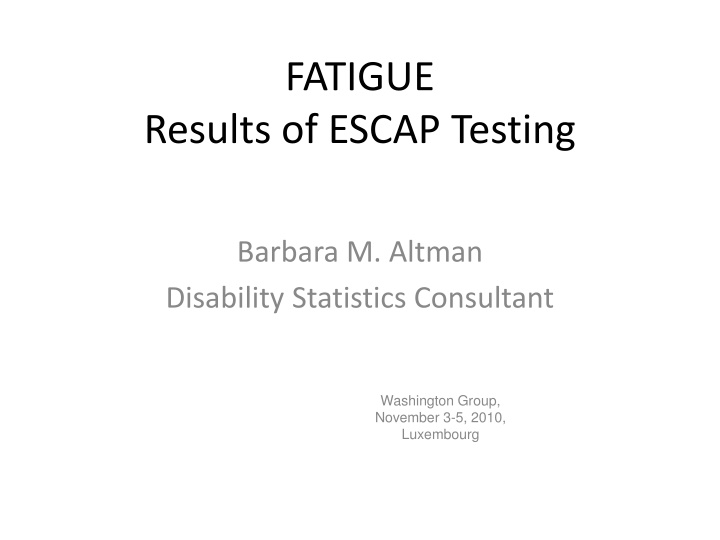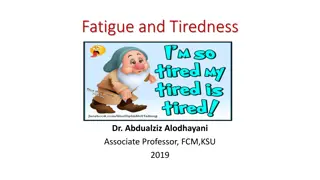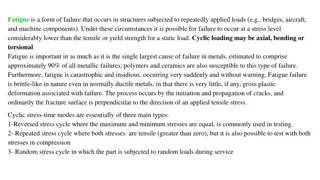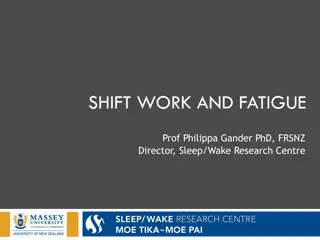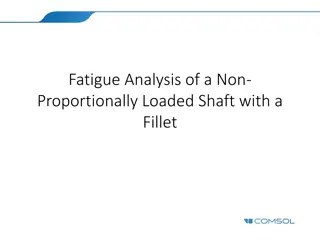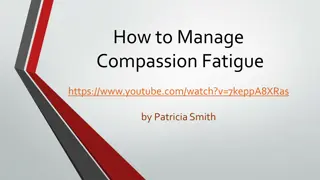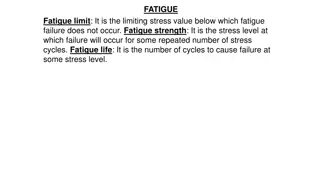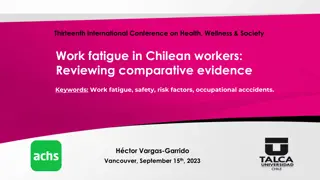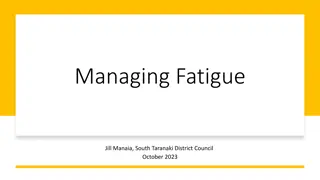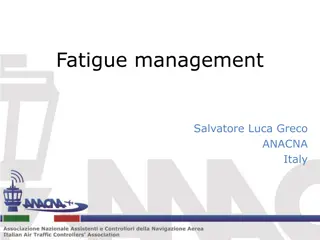FATIGUE Results & Cognitive Testing Insights
The content discusses the results of fatigue testing conducted by Barbara M. Altman in Luxembourg, focusing on questions used, cognitive test results, and field testing questionnaires. Insights reveal various factors contributing to tiredness, such as physical activity, lack of sleep, health-related issues, and more. Adjustments were made to question categories for better interpretation. The comprehensive analysis provides valuable data on understanding fatigue, its impact on daily activities, and the need for further research.
Download Presentation

Please find below an Image/Link to download the presentation.
The content on the website is provided AS IS for your information and personal use only. It may not be sold, licensed, or shared on other websites without obtaining consent from the author.If you encounter any issues during the download, it is possible that the publisher has removed the file from their server.
You are allowed to download the files provided on this website for personal or commercial use, subject to the condition that they are used lawfully. All files are the property of their respective owners.
The content on the website is provided AS IS for your information and personal use only. It may not be sold, licensed, or shared on other websites without obtaining consent from the author.
E N D
Presentation Transcript
FATIGUE Results of ESCAP Testing Barbara M. Altman Disability Statistics Consultant Washington Group, November 3-5, 2010, Luxembourg
Questions Used in ESCAP Cognitive Test Questions 10.1a Do you have frequent feelings of being tired? 10.2 In the past 3 months, how often did you feel tired? Some days, most days, or every day? 10.3 Thinking about the last time you felt tired, how long did the tiredness last? Some of the day, most of the day, or all of the day? 10.4 Thinking about the last time you felt tired, how would you describe the level of tiredness? Mild, moderate or severe? Response Options 1) Yes 2) No If No, go to next section. 1) Some days 2) Most days 3) Every day 1) Some of the day 2) Most of the day 3) All of the day 1) Mild 2) Moderate 3) Severe 1) Worse than usual 2) About the same as usua1 3) Better than usual _____ age in years 1) Due to a health problem 2) Something else: _____________ 1) Yes 2) No 1) Yes 2) No 10.5 Thinking about the last time you felt tired, was the tiredness worse than usual, better than usual, or about the same as usual? 11.1ai How old were you when the tiredness began? 12.1i Is your tiredness due to a health problem or something else? 13.1i Does your tiredness limit your ability to carry out daily activities? 13.2bi Does your tiredness limit your ability to carry out other activities that are not part of your day-to-day life? Washington Group, November 3-5, 2010, Luxembourg
Results of Cognitive Tests Cognitive stories provided many explanations for the tiredness described by the questions on frequency and intensity. The tiredness was a result of a lot of physical activity or lack of sleep (such as having a new baby). Other explanations were more health related such as caused by pain or the side effect of medication. Other responses included that the tiredness was seasonal or usual. Some respondents asked for clarification in an effort to differentiate usual tiredness from tiredness associated with other factors. In all, the results of the cognitive testing was not definitive. Some small changes were made to the field test questions, additional questions were also included in the field test in order to get a better understanding of the interpretation of the fatigue questions. In question 3 the reply categories were changed since respondents to the cognitive questions appeared to have difficulty applying the categories mild, and moderate to the experience of fatigue. Washington Group, November 3-5, 2010, Luxembourg
First Half of Field Testing Questionnaire Questions TIRED_1 In the past 3 months, how often did you feel very tired or exhausted? Response Options 1) Never 2) Some Days 3) Most Days 4) Everyday 7) Refused 9) Don t know If Never to TIRED_1, skip to Section L : Needs for Assistance, Health Conditions and Impairments. TIRED_2 Thinking about the last time you felt very tired or exhausted, how long did it last? 1) Some of the day 2) Most days 3) Every day TIRED_3 Thinking about the last time you felt this way, how would you describe the level of tiredness? 1) A little 2) A lot 3) Somewhere in between a little and a lot 7) Refused 9) Don t know If "Somewhere in between a little and a lot" to TIRED_3, continue with TIRED_4. Otherwise, skip to P_TIRED_4. TIRED_4 Would you say it was closer to a little, closer to a lot, or exactly in the middle? Would you say it was closer to a little, closer to a lot, or exactly in the middle? 1) Closer to a little 2) Closer to a lot 3) Exactly in the middle 7) Refused 9) Don t know Washington Group, November 3-5, 2010, Luxembourg
Second Half of Field Test Questionnaire P_TIRED_4 Is your tiredness the result of any of the following? a) Too much work or exercise? b) Not getting enough sleep? c) A physical or health-related problem? d) Something else? (please specify): ____________________________ Each category above has response options of: 1) Yes 2) No 7) Refused 8) Not applicable 9) Don t know TIRED_5 How old were you when the tiredness began? _____ Age in years 777. Refused 999. Don t know 1. Not at all 2. A little 3. A lot 4. Completely 7. Refused 9. Don t know TIRED_6 How much does your tiredness limit your ability to carry out daily activities? Washington Group, November 3-5, 2010, Luxembourg
ESCAP Field Test Conducted in six countries Kazahkstan, Cambodia, Sri Lanka, Maldives, Mongolia, Philippines Total of 6309 responded to the fatigue questions Analyses that follow use that data to examine relationship among the questions asked. Washington Group, November 3-5, 2010, Luxembourg
Proportion in Each Country Indicating Some Level of Fatigue Acknowledge Some Level of Fatigue Yes No Refused Don t know Sri All Lanka 11.3 88.0 0.1 0.6 100 (1000) Kazakhstan 63.4 36.5 0.0 0.1 100 (1000) Countries 47.3 52.5 0.0 0.2 100 (6309) Cambodia 59.0 40.8 0.0 0.2 100 (1008) Maldives 34.5 65.2 0.2 0.1 100 (1013) Mongolia 53.6 46.2 0.0 0.2 100 (1222) Philippines 59.2 40.8 0.0 0.0 100 (1066) N Washington Group, November 3-5, 2010, Luxembourg
Relationship of Intensity of Fatigue to Duration of Fatigue Intensity of Fatigue Duration of Fatigue All of the day 24.8 2.1 12.4 8.8 33.7 0.9 Some of the day 73.5 3.8 12.2 2.4 7.9 0.2 Most of the day 26.9 6.1 20.4 9.8 36.3 0.5 Refuse d Don t Know Total A Little Closer to a little In between Closer to a lot A lot Refused/Don t know 0.0 0.0 0.0 0.0 0.0 100 33.3 0.0 0.0 0.0 0.0 66.7 61.2 3.9 13.3 4.2 16.6 0.8 100 2216 100 427 100 330 100 2 100 18 100 2993 Count Washington Group, November 3-5, 2010, Luxembourg
Relationship of Frequency of Fatigue with Duration of Fatigue Frequency of Fatigue Every day 38.5 Duration of Fatigue Some of the day Most of the day All of the day Refused Don t Know Some days 82.6 (n=1962) 10.6 Most days 44.0 Refused Don t Total Know 16.7 0.0 74.0 33.2 22.6 0.0 0.0 14.3 6.5 0.0 0.3 100 2376 22.8 0.0 0.0 100 364 38.9 0.0 0.0 100 239 0.0 100 0.0 100 2 0.0 0.0 83.3 100 12 11 0.10 0.6 100 2993 Count Washington Group, November 3-5, 2010, Luxembourg
Relationship of Frequency of Fatigue to Intensity of Fatigue Frequency of Fatigue Every day Intensity of Fatigue A little Some days 69.4 (N=1643 ) 4.1 12.7 3.3 10.5 0.3 100 2376 Most days Refused Don t Know 16.7 Total 30.2 31.8 0.0 61.2 Closer to a little In between Closer to a lot A lot Refused/DK 2.7 19.5 7.7 39.3 0.5 100 364 4.2 11.3 7.5 44.4 0.8 100 239 0.0 0.0 0.0 0.0 100 100 3 0.0 0.0 0.0 0.0 83.3 100 12 3.9 13.3 4.2 16.6 0.8 100 2994 Count Washington Group, November 3-5, 2010, Luxembourg
Cross-frequency for fatigue frequency, duration and intensity in field test interviews Tired Frequency Some Most Every Tot days days day al Intensity A little Duration Some of the day 1,498 79 49 1,6 26 Most of the day 82 22 11 115 All of the day 57 9 16 82 Total 1,637 110 76 1,8 23 Closer to a little Duration Some of the day 72 7 6 85 Most of the day 20 3 3 26 All of the day 6 0 1 7 Total 98 10 10 118 In between Duration Some of the day 223 34 13 270 Most of the day 56 27 4 87 All of the day 21 10 10 41 Total 300 71 27 398 Closer to a lot Duration Some of the day 39 8 7 54 Most of the day 21 14 7 42 All of the day 19 6 4 29 Total 79 28 18 125 A lot Duration Some of the day 127 32 16 175 Most of the day 71 55 29 155 All of the day 51 56 61 168 Total 249 143 106 498 Washington Group, November 3-5, 2010, Luxembourg
Distribution of Fatigue Measure Summarizing Frequency, Duration and Intensity Based on Field Test Interviews Summary fatigue measure Low Middle High Total N Percent 64.0 16.6 19.4 100.0 1,895 491 576 2,962 Washington Group, November 3-5, 2010, Luxembourg
Summary Fatigue Measure by Activity Limitation in Field Test Interviews. Impact on daily activities Not at all A little A lot Completely Total (2,932) Summary Fatigue measure Low 52.7 45.8 1.3 0.2 1,874 Middle 32.5 57.0 9.1 1.4 486 High 23.8 43.9 29.0 3.3 572 Washington Group, November 3-5, 2010, Luxembourg
Conclusions Introductory statement or screener question needed Multidimensionality of fatigue demonstrated Consistency of cross-national responses may be problematic Age differences identify fatigue with aging process Creation of a combination measure looked promising Washington Group, November 3-5, 2010, Luxembourg
Recommendation While the results are not as clearly evident as we would like, another set of testing, taking into account the lessons learned here, should produce a useable measure of fatigue. Fatigue is an important element in understanding the nature of the factors that contribute to disability. Lack of energy or exhaustion, which can result from any number of conditions or treatments, can create problems with activities that are not otherwise captured by standard questions, such as difficulties walking, self care and so on. However fatigue is a complicated process which is made up of the frequency with which it occurs, the duration and the intensity with which it is felt. In addition there were widely varying responses shown across countries which may be an indication of either different cultural conceptualizations of what fatigue is, whether one can admit to such a problem or It may also reflect a translation issue. It is important to keep the fatigue concept alive in the extended measurement development process, but these results need to be further analyzed to identify if the questions need to be changed or adapted to provide a more robust representation of the concept. Washington Group, November 3-5, 2010, Luxembourg
